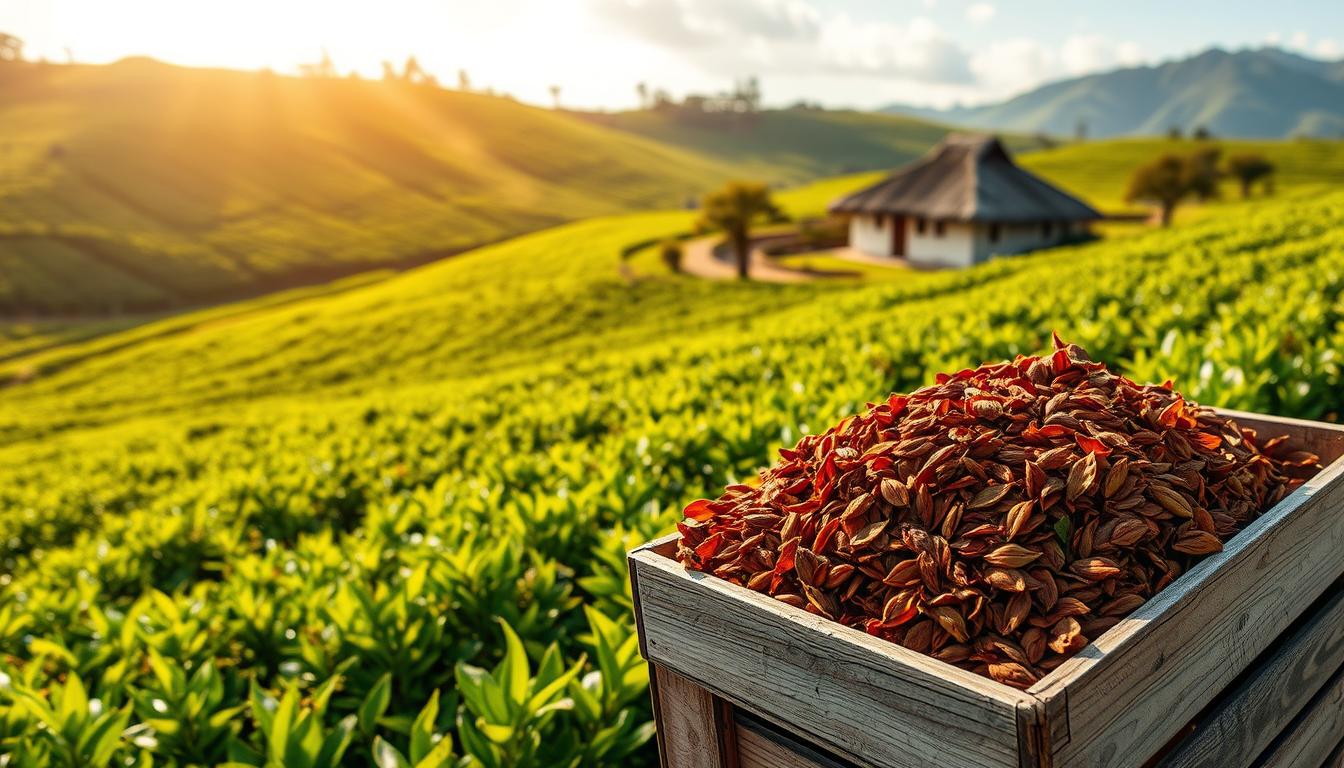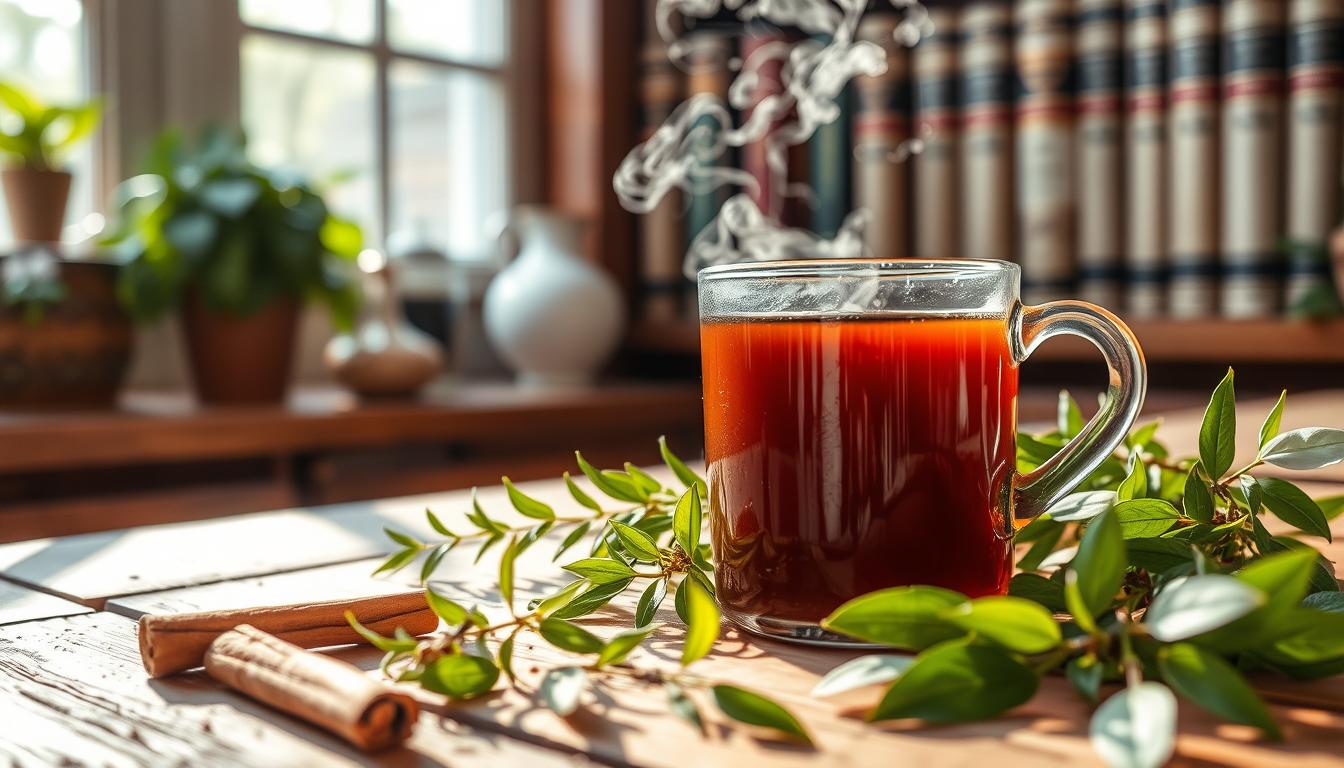Did you know that over 80% of expecting mothers look for caffeine-free alternatives to traditional beverages? Herbal options like rooibos tea have gained popularity for their unique benefits. Made from the dried parts of the South African red bush, this caffeine-free drink offers a soothing and healthy choice for women during this special time.
Rich in antioxidants, rooibos tea supports overall health and wellness. Its natural properties make it a favorite among tea enthusiasts. For those concerned about its effect on their baby, multiple sources confirm its safety for both pregnancy and breastfeeding.
While moderation is key, enjoying a cup or two daily is generally considered safe. However, if you plan to consume more, consulting your healthcare provider is always a good idea. Stay tuned as we explore the benefits and considerations of this unique herb in the sections below.
Key Takeaways
- Rooibos tea is naturally caffeine-free, making it a great option for expecting mothers.
- It’s made from the South African red bush and is rich in antioxidants.
- Multiple sources confirm its safety for pregnancy and breastfeeding.
- Moderation is advised, with 2-3 cups per day being a common recommendation.
- Always consult your healthcare provider for personalized advice.
Exploring Rooibos Tea: Origins and Unique Properties
Originating from the rugged landscapes of South Africa, this herbal drink has a rich cultural heritage. For centuries, indigenous communities have cherished the plant for its vibrant red hue and soothing properties. Its journey from a local remedy to a global favorite is a testament to its unique appeal.

History and Cultural Background
The story of this caffeine-free leaf begins in the Cederberg region of South Africa. Traditionally, it was harvested, fermented, and dried to create a flavorful brew. Over time, its popularity spread, becoming a staple in many households. By the mid-2000s, it had gained international recognition as a versatile herbal tea.
Its cultural significance extends beyond its taste. Often mixed with botanicals like honeybush, it became a symbol of natural wellness. Today, it continues to be celebrated for its connection to South African heritage and its role in promoting health.
Nutrient Profile and Antioxidant Benefits
This plant is packed with nutrients that set it apart from traditional tea leaves. Rich in polyphenols, it offers powerful antioxidant properties. These compounds help combat oxidative stress, supporting overall health.
Here’s a breakdown of its key nutrients:
| Nutrient | Benefit |
|---|---|
| Polyphenols | Reduce inflammation and support heart health |
| Vitamin C | Boosts immune function |
| Magnesium | Promotes muscle and nerve function |
| Calcium | Strengthens bones |
Its caffeine-free nature makes it an excellent choice for those seeking a calming beverage. Whether enjoyed hot or cold, it delivers a refreshing experience with every cup. Stay tuned as we dive deeper into its benefits and safety in the next sections.
is rooibos tea safe during pregnancy
Many expecting mothers wonder about the safety of herbal drinks during their journey. With its caffeine-free nature and rich antioxidant profile, this South African herb has gained attention. But what does the research say?

Research Findings and Safety Guidelines
Studies on pregnant rats have shown no adverse effects from moderate consumption. While formal research on humans is limited, experts agree that this herb is generally safe. Health organizations like ACOG recommend moderation and consulting your healthcare provider.
Here’s a quick overview of the findings:
| Study Focus | Outcome |
|---|---|
| Pregnant Rats | No adverse effects observed |
| Human Consumption | Generally safe in moderation |
Doctor Recommendations for Expecting Mothers
Healthcare providers often support moderate intake of this herbal drink. It’s a great alternative to caffeinated options like coffee or black tea. However, balancing your overall caffeine intake is crucial.
Here are some practical tips:
- Limit consumption to 2-3 cups daily.
- Monitor for any unusual effects.
- Always consult your OB-GYN for personalized advice.
By following these guidelines, you can enjoy this soothing beverage while prioritizing your health and your baby’s well-being.
Comparing Rooibos with Other Tea Options for Pregnancy
When it comes to choosing beverages during pregnancy, options matter. Many women seek drinks that are both enjoyable and beneficial for their health. This section explores how rooibos stacks up against other popular choices like black and green tea.
Caffeine-Free Alternatives and Their Benefits
For expecting mothers, caffeine-free options are often a priority. Rooibos stands out as a natural choice, offering a rich flavor without the stimulating effects of caffeine. Unlike black or green tea, it provides a calming experience with every cup.
Other herbal options, such as chamomile or peppermint, also offer benefits. These drinks can support relaxation and digestion, making them excellent alternatives. However, rooibos is unique for its high antioxidant content, which promotes overall wellness.
Understanding Potential Risks in Caffeinated Teas
While black and green tea are popular, they contain caffeine. Excessive intake can lead to restlessness, increased heart rate, or sleep disturbances. For pregnant women, monitoring caffeine consumption is crucial to avoid potential risks.
Here’s a quick comparison of caffeine levels per cup:
| Type | Caffeine Content |
|---|---|
| Black Tea | 40-70 mg |
| Green Tea | 20-45 mg |
| Rooibos | 0 mg |
Choosing a caffeine-free option like rooibos can help avoid these concerns. Its natural compounds also provide additional health benefits, making it a smart choice for expecting mothers.
Always read labels carefully and consult your healthcare provider to ensure your drink choices align with your needs. By making informed decisions, you can enjoy a healthy and enjoyable pregnancy journey.
Brewing and Enjoying Rooibos Tea Safely
Brewing the perfect cup of herbal tea can be both simple and rewarding. Whether you’re new to this South African leaf or a seasoned enthusiast, mastering the right techniques ensures a flavorful and safe experience. Let’s explore the best methods to prepare this caffeine-free option.
Step-by-Step Brewing Methods
Start by using fresh, filtered water for the best results. Bring the water to a boil, then let it cool slightly to around 200°F (93°C). This temperature helps extract the full flavor without bitterness.
Measure one teaspoon of loose-leaf tea or one tea bag per cup. Place the leaves in a tea infuser or directly into your teapot. Pour the hot water over the leaves and let them steep for 5-7 minutes. This ensures a rich, aromatic brew.
Alternative Brewing Techniques
For a refreshing twist, try cold-brewing. Add the leaves to cold water and let them steep in the refrigerator for 8-12 hours. This method produces a smooth, less tannic flavor, perfect for warm days.
Here are some tips for adjusting your brewing techniques:
- Use a timer to avoid over-steeping, which can make the drink bitter.
- Experiment with the amount of leaves to suit your taste preferences.
- Store your leaves in an airtight container to maintain freshness.
Moderate consumption is key to enjoying this beverage safely. Stick to 2-3 cups daily for a balanced approach. Always consult your healthcare provider if you have specific concerns.
By following these steps, you can enjoy a perfect cup every day. Whether hot or cold, this herbal option offers a soothing and healthy addition to your routine.
Potential Health Benefits for Pregnant Women
Pregnancy brings unique nutritional needs, and herbal options can play a supportive role. This caffeine-free beverage offers a range of benefits that can enhance maternal well-being. From reducing oxidative stress to promoting digestive comfort, it’s a versatile choice for expecting mothers.
Antioxidants, Bone Health, and Cholesterol Improvement
Rich in antioxidants, this drink helps combat cellular stress, supporting overall health. Its polyphenols reduce inflammation and may improve heart health. Additionally, it contains calcium and magnesium, which are essential for strong bones and proper muscle function.
Studies suggest that regular consumption can also help manage cholesterol levels. This makes it a valuable addition to a balanced diet during pregnancy. Its natural compounds work together to promote wellness without the need for caffeine.
Relief from Morning Sickness and Digestive Comfort
Many women experience morning sickness during their first trimester. This herbal option can provide soothing relief, calming the stomach and reducing nausea. Its gentle properties also support digestive health, making it easier to manage discomfort.
For those struggling with indigestion or bloating, a warm cup can be particularly comforting. Its natural ingredients work to ease symptoms, offering a safe and effective solution.
Enhancing Flavor with Natural Additives
Adding natural ingredients like ginger, lemon, or milk can elevate the flavor profile. Ginger adds a zesty kick and may further aid digestion. Lemon provides a refreshing citrus note, while milk creates a creamy texture.
These additives not only enhance taste but also offer additional nutrients. For example, ginger is known for its anti-nausea properties, and lemon provides a boost of vitamin C. Experimenting with combinations can make each cup a delightful experience.
By incorporating this beverage into your routine, you can enjoy its many benefits while savoring its rich, natural flavors. Always remember to consume it in moderation and consult your healthcare provider for personalized advice.
Conclusion
Choosing the right beverage can make a big difference for expecting mothers. This herbal tea, derived from a South African plant, offers a caffeine-free option packed with antioxidants. Its natural properties support overall health, making it a popular choice for women during this special time.
Research highlights its safety when consumed in moderation. Experts recommend limiting intake to a few cups daily and consulting your healthcare provider for personalized advice. Compared to caffeinated options like black tea or green tea, this drink poses no risk of overstimulation.
Brewing methods also play a role in maximizing its benefits. Whether hot or cold, this beverage delivers a soothing experience. Adding natural ingredients like lemon or milk can enhance flavor while providing additional nutrients.
Always prioritize moderation and seek guidance from your provider. This herbal option can be a valuable addition to your routine, offering both comfort and health benefits. Make informed choices to support your well-being and your baby’s development.

